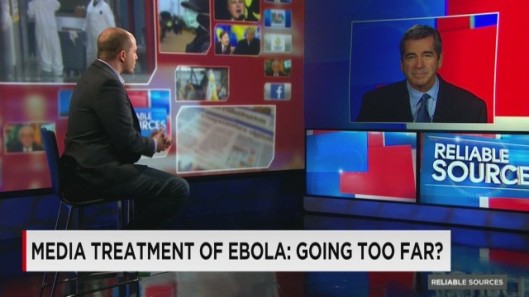This Sunday, I arrived home after spending three weeks leading communications training seminars in Nigeria.
Yes, that means I was in West Africa – where the media continues to headline as the epicenter of the “Deadly Ebola Outbreak.”
And yesterday, I received an email from a parent of one of my daughter’s school friends who happens to be a doctor here in Ireland.
I would suggest you call your General Practitioner and inform him you have been in Nigeria. Ask him if they have any procedure in place to deal with you in the case you have any symptoms during the next 3 weeks.
Should I?
I was in hotel conference rooms and professional office buildings conducting training sessions with business executives and other leaders. I didn’t step near a hospital nor attend any funerals. Certainly I witnessed no one exhibiting any of Ebola’s well-publicized feverish symptoms or violent vomiting or bleeding.
But I did fly on commercial airlines. Before my flight, airport staff stopped every passenger and took their temperature with a small plastic laser gun. I was 36.6 Centigrade. I was let through. On the British Airways plane to London from Lagos, the flight attendants announced prior to takeoff they would go through the cabin and “spray something for disease.” Their aerosol cans spritzed out some sweet-slightly-chemically-smelling stuff. What was it exactly? The attendants didn’t say and they most definitely did not mention Ebola by name.
When we landed in London, the customs officer didn’t ask me anything about my visit in Nigeria. Perhaps because he knew that last week the Centers for Disease Control and Prevention echoed what Nigerian officials were saying the entire three weeks I was in-country: that the disease is contained and there are no new cases. (World Health Organization numbers say Nigeria had only 20 cases and 8 deaths, dramatically fewer than what is still going on in Sierra Leone, Guinea and Liberia.)
But then today’s New York Times today describes Thomas E. Duncan, the Liberian who flew to Dallas last month and who notoriously has become the first Ebola case diagnosed in the US, as flying “while he was contagious.”
Did someone fly near me who was contagious? I swear I didn’t knowingly get anyone’s drool or whatever-other-kind-of-fluids you can imagine on me during my flight or my visit.
As a former CNN journalist who now teaches about the power of words, why did the NYT say Duncan was contagious on the flight?
Especially when, just a few paragraphs later in the same article, it goes on to say he developed symptoms five days after his flight and then quotes officials as emphasizing
there is no risk of transmission from people who have been exposed to the virus but are not yet showing symptoms.
So which is it? Was he contagious on the flight when he apparently had the virus in his body, but wasn’t showing symptoms? Or did he become contagious only after the disease progressed enough that his body began to manifest the tell-tale symptoms of fever, diarrhea and vomiting?
I don’t ask this to be glib. The media has a responsibility to report this as accurately as possible. To help spread the correct information. So others don’t unknowingly spread something far worse.
Like me, I guess. That nice lady and her son sitting next to me on my flight – who were headed to Texas (yes, Texas) – seemed healthy enough. But were they possibly contagious?
I don’t know. I really don’t know.
Copyright 2014 Gina London. All Rights Reserved.







